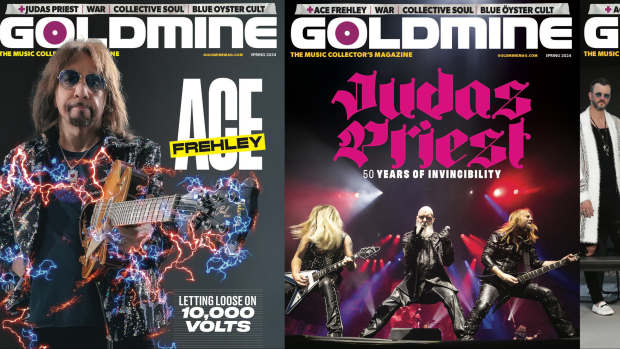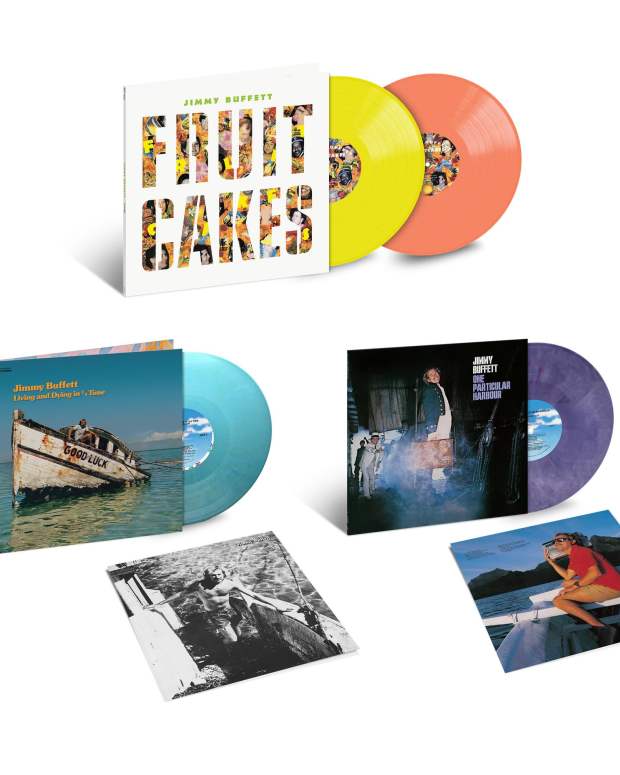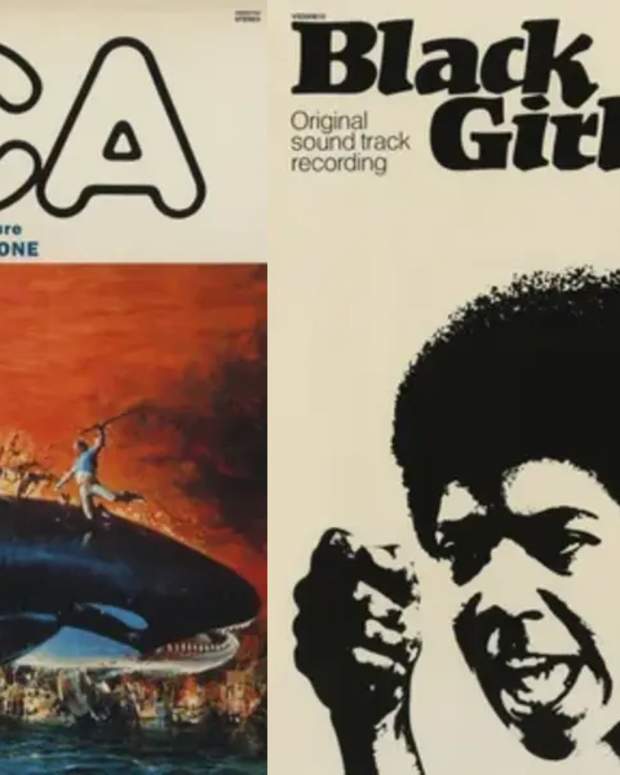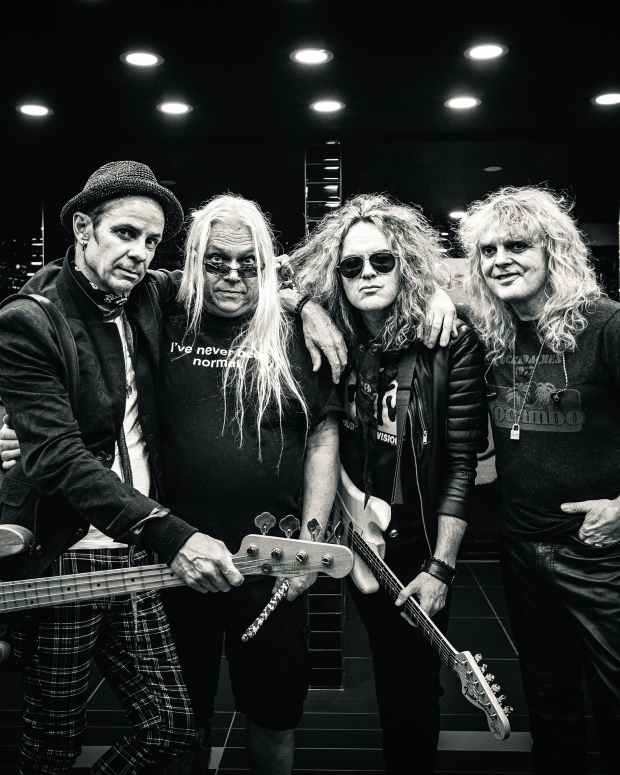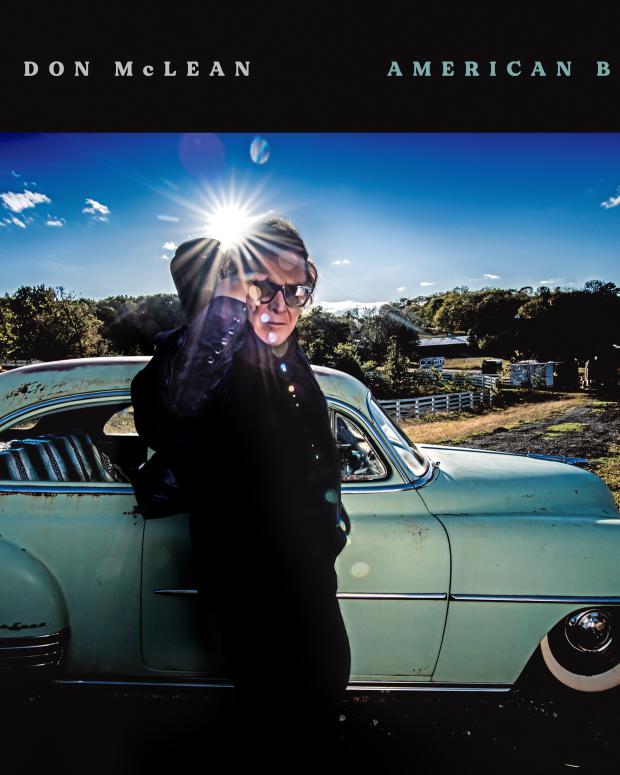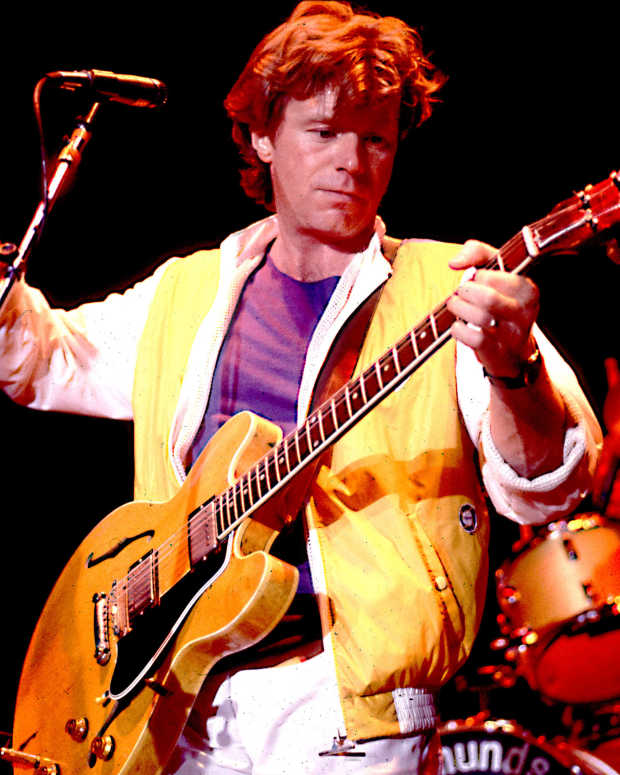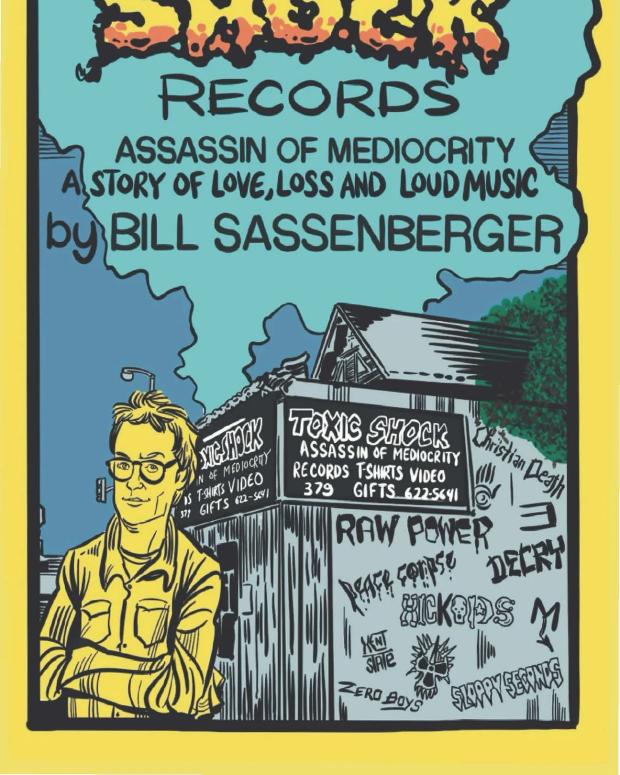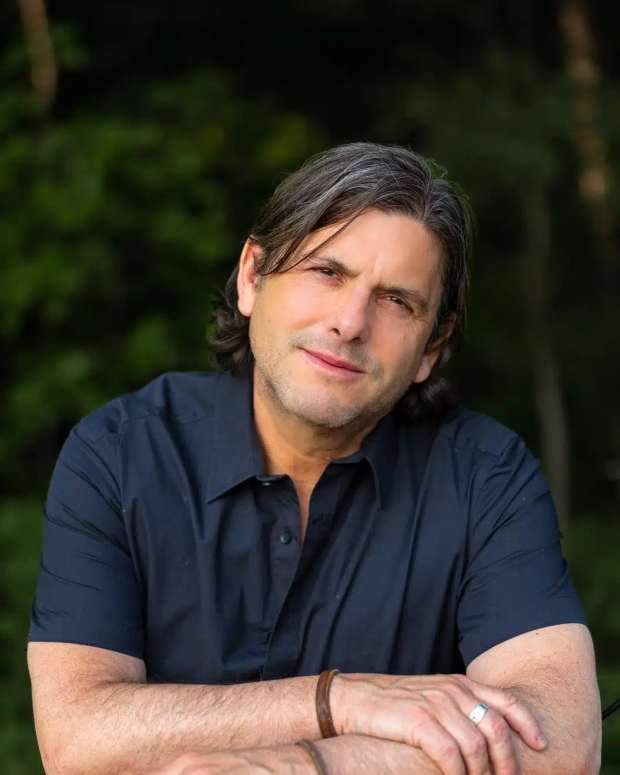Elton John and Ray Cooper formed the perfect team in Moscow
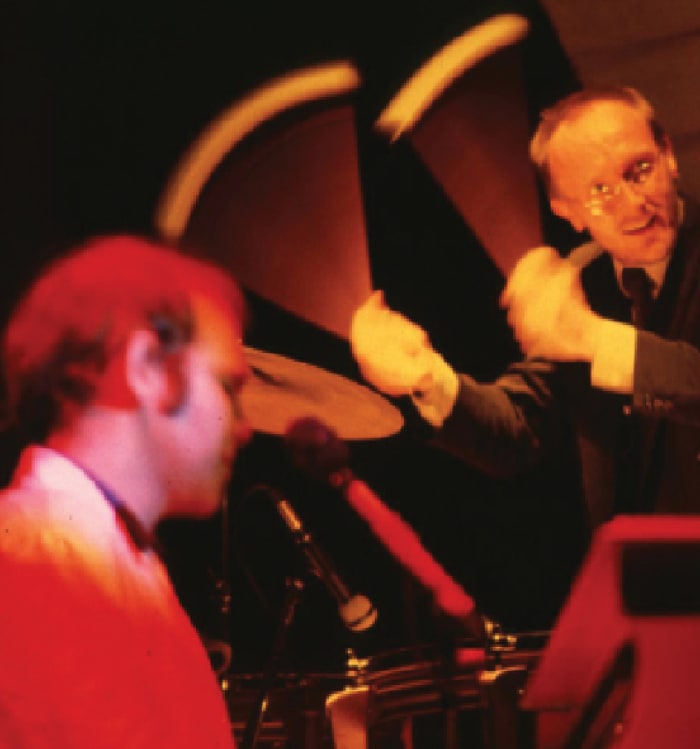
Elton John and Ray Cooper completely in sync while performing onstage. Photo by PATTI OUDERKIRK/WIREIMAGES.
By Gillian G. Gaar
Ray Cooper joined Elton John’s band as a percussionist in 1972. “It was a ticket to ride,” he says today, looking back at his decades of experience working with John, both onstage and in the studio. “It was like joining the navy. I saw the world, and it was extraordinary.”
But until recently, one of his most historic performances with Elton John was largely unavailable, at least officially. In May 1979, John became one of the first major Western rock acts to play behind the Iron Curtain, taking his music to the heart of the Union of Soviet Socialist Republics (USSR). Forty years later, Live From Moscow, a recording of the tour’s final concert in its entirety, was released for Record Store Day in 2019. Now comes a wider release, in LP, CD and digital formats. It’s an exciting document of what Cooper calls “an extraordinary experience, one that’s stayed with me all my life, and will to the end of it, I’m sure.”
Cooper first met John when both were working in the British music industry as session musicians; he knew John by his real name, Reginald Dwight. “People forget that he was a session musician,” says Cooper. “And he was a wonderful working musician; a backing vocalist sometimes, a pianist sometimes. I would see Elton a lot, as a fellow worker. And then one day, I went into a session, and it was for an ‘Elton John,’ and I didn’t know he was called Elton John at that time. And when I arrived for the session, I was surprised to see it was Dwight!”
John’s concerts in the 1970s were known for their over-the-top production and lavish costumes. But in 1979, he opted to shake things up by going in the opposite direction. In the “A Single Man” tour, everything was scaled back to basics; the show featured John alone at the piano for the first half, with Cooper joining him on percussion during the second half. And there were no flashy outfits in sight.
“The show was not an extravaganza,” Cooper explains. “It was about the music, and the drama of Bernie Taupin’s lyrics and Elton’s wonderful melodies. It was a theatrical show. What I was there for, I think, was to add color to the drama. I think that’s one of the reasons he asked me to go along with him. There’s something very wonderful, something very interesting in two people making music together; there’s a dialogue that’s happening.
“As a percussion player, you’re a colorist. You’re not necessarily a rhythmist. Elton didn’t need me to keep time. He’s one of the most perfect timekeepers in the world. His left hand on the piano is always, always, always in time.”
The show featured a mix of well-known numbers (“Daniel,” “Rocket Man”), instrumental showcases (“Funeral for a Friend”) and favorite covers (“I Heard It Through the Grapevine”). “We spent quite a lot of time working out what would be the best for two people to play,” Cooper says. “What songs would be the most dramatic, and how to get the most out of them. Elton wanted to push his vocal prowess and his piano prowess as far as it could go. And his piano playing got better and better, and his voice got stronger and stronger over the course of that tour. I think this two-man show was the beginning of how he pushed the barriers.”
The Russian authorities had been thinking about inviting a Western artist to appear in the USSR, and a Russian Cultural Envoy caught a performance of the “Single Man” tour in Oxford, England, on April 17, 1979. “He liked it very, very much,” says Cooper. “The Russians decided that was what they wanted. It was the early days of perestroika, the beginnings of that movement.
“People were so enthused by the fact that we would actually come to Russia,” he continues. “It was very, very moving.” For his part, Cooper was also excited by the prospect, being a fan of Russian composers like Igor Stravinsky and Dmitri Shostakovich. Arrangements were made quickly, and just over a month after the Oxford show, the “Single Man” tour arrived in Russia for eight performances; May 21 to 24 at the Bolshoi Oktyabrsky Concert Hall in what was then Leningrad (now St. Petersburg), and May 25 to 28 at the Rossiya Concert Hall in Moscow.
“Each concert revealed something different about the Russians,” says Cooper. “The way they put concerts on for instance, the people you met, and the audiences. So it kept us on our toes. There was nothing that we could, in a sense, rely upon. Everything was fresh.”
Initially, the audience response was subdued. “It was a shock, but it was wonderful. It woke us both up. Because Elton was very successful in America and England, and he could just walk on the stage and stand still and people would love it. But this was a test of our skills, our musicality. And beyond that, our ability to communicate in this wonderful language of music to an exotic other language, i.e., Russian.”
They later learned that security at the first shows was responsible for keeping people in their seats. “Gentlemen were sitting at the end of the rows, so if anybody got overexcited they would make sure they didn’t go anywhere,” says Cooper. “But then they disappeared, and they allowed the concert to take its natural course. And of course, people did get very excited. They listened fervently; they wanted to take every moment of Elton’s music into their soul. But they also eventually got up, and they clapped and they danced, and that was wonderful.
“And they knew the music; they’d been listening to it illegally on American Forces radio. A lot of people in Russia, strangely enough, were speaking English because of listening to pop records. Because of listening to The Beatles, to Elton John, to the stuff that they could listen to from across the borders, where the American and Allied Forces radio managed to get through. They would make illegal recordings of it, and they would learn the language and learn it well. Spoke fluent English purely by listening to pop records; that’s the strength of the human survival factor and human nature. Isn’t that wonderful?”
John also enjoyed giving a little tweak to the authorities. It had been requested that he not excite the crowds by playing The Beatles’ “Back in the U.S.S.R.” — which of course guaranteed its inclusion in the set list (albeit as part of a medley with “Crocodile Rock” and “Get Back”). “If you tell him not to do something, that’s the best way to get him to do it!” laughs Cooper. “That was a red flag to the bull. And so he did it! And the audience loved it, too. And then it was accepted. He did it at every concert.”
Cooper enjoyed the experience of getting out and exploring the city when he could. “I went everywhere in Leningrad, as it was called then. And I went everywhere in Moscow, markets and things. I found the Russian people extraordinary. I fell in love with everyone I met and everything I saw, and the conversation. People wanted to talk there; they wanted to talk, they wanted to drink with you, to laugh with you, to cry with you.”
But trips further afield ran into official roadblocks. “We had a couple of days off, and I wanted to go to Kiev. What I didn’t realize was that it’s a three-day journey one way by train, so that was impossible. And there were no internal flights; we were told there weren’t anyway. It’s such a vast country and I’m sure they used that as excuse, too. It seemed as if everything was available, except when you asked to do something, they would suddenly say, ‘Well, it’s a bit of a problem today because this train is not working.’ In other words, they very gently made it quite difficult to do anything. Because everything was guarded, very much so. It was very difficult to get out of the region where you lived; you had to have permission to travel.”
He did manage an outing one evening, with a local poet and his friends. “We were all invited back to his dacha (country house), just outside Moscow,” Cooper recalls. “Which was difficult to get to because we weren’t supposed to travel outside of the various sections. But we got there and we had the most incredible evening of storytelling, of poetry. It was magical, magical.”
The final night of the tour was broadcast by the BBC, the source of numerous subsequent bootlegs of the show. Footage also appeared in the 1979 documentary To Russia…With Elton. With the complete show now widely available, Live From Moscow is the perfect souvenir of a moment that still has resonance for those who were lucky enough to witness it in person.
“I still meet people who say that,” Cooper says. “And it shocks me. I can walk around in America, or London, or wherever, and it’s Russians that come up to me and say, ‘Sorry to disturb you, but are you Ray Cooper?’ And I say, ‘Yeah, I am.’ ‘Oh, I was a little boy and I saw that concert in Russia 1979.’ And I keep using the word ‘moving,’ but it is. We live in a world where everything is put in front of us and we take things for granted. But when you come across people that say you’ve changed their lives through music, then yeah, you know you’ve done your job. And what a beautiful job to do. I’m very lucky.”
Cooper’s made return visits to Russia in the years since his first visit. “I’ve been lucky to go back there quite a few times, and I’ve loved it every time I’ve been there,” he says. “The people — it’s a very rich place, very rich, it’s full of all sorts of culture.”
And he’s pleased to have contributed to lessening the tensions between Russia and the outside world. “Yeah, it was an extraordinary event for both sides. It was a part of the process that all of us were going through at that period, of trying to understand, trying to help this fledgling state of perestroika, and things that were to come. And I think, I hope, that perhaps we might’ve played a small part in helping to bring some form of understanding between these two major countries, America and Russia — Russia and the rest of the world actually. I hope so.
“So thank you Elton, for taking me there.”



